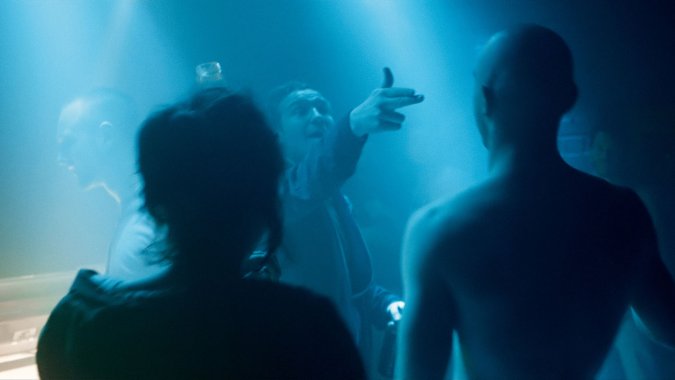The roller coaster metaphor isn’t a perfect one to describe German filmmaker Sebastian Schipper’s single take dramatic crime thriller, Victoria, but it’s apt. Especially if you’re the type who gets nauseated by endless litany, easy to anticipate spirals, and, after a tedious build, you just want it all to end.
That’s not to say the whole of Victoria is a nauseous spectacle speeding towards a sudden finale – it actually runs about 40 minutes or so past what should have been its resolution and that’s where it suffers the most – there are several idiosyncrasies, character driven fine points, and yes, technical embellishments that deem the film worthwhile. But there’s also a lot of scheiße interfering every step of the way.
The gimmick, and it’s a good one, is the main draw to see Victoria, unquestionably, but just because a filmmaker can orchestrate some expert choreography in a continuous 140 minute shot doesn’t necessarily mean one should.
To draw a comparison to a few fairly recent astonishing single-take sequences, like John Woo’s total grandstanding in his balletic shootout in Hard Boiled – at three minutes it’s not the two plus hours of Schipper, but it doesn’t need to be – or perhaps more proportionate, Alexander Sokurov’s 99 minute single-take feature film feast, Russian Ark, which is an invigorating bravura experiment.
Russian Ark is a bracing tonic, a generous, and endlessly inventive adventure through a museum, with a cast of hundreds, where as Victoria almost feels like a cramped chamber piece by comparison.
Admittedly, the shaky handheld camerawork that Schipper and cinematographer Sturla Brandth Grøvlen utilize does capture much of the emotional state of the characters – drunk, blitzed on coke, the viewer is soon in search of a barf bag, too – it actually works magnificently for several consecutive sequences, but it isn’t long before the viewer is desensitized.
Opening on a grand mal-inducing strobic dance floor in a rank Berlin nightclub we meet Victoria (Laia Costa), who soon pairs up with a smooth-talking Sonne (Frederick Lau) and his bevy of obnoxious pals. Costa and Lau have real chemistry and charisma, and the scenes of intimacy and budding courtship between them are the strongest aspects of the film.
But, inescapably in this post-Tarantino subterrane milieu, Sonne’s less savory cohorts, namely the agitated-from-the-second-we-meet-him, Boxer (Franz Rogowski), rope the eponymous young ingenues into participating in a bold, early morning heist. Complications ensue with some mostly predictable fallout and bloodletting.
At its best Victoria parallels the nocturnal adventure odyssey of Scorsese’s After Hours, and the frequent dashes of dark humor service the story well, but at its worst the film is just exhibitionist swagger and wasted possibility. The real time mise en scène sporadically sublimates the film, as does some tastefully overpowering musical interpositions courtesy of Nils Frahm – if nothing else, his contributions to the film make the soundtrack an essential – but it all feels for naught when the rollercoaster ride screeches to a drawn out halt.
What’s truly audacious is that the filmmakers didn’t show the forbearance and daring to end it all on a much more satisfying note about an hour prior. Victoria is flashy fare for sardonic film school students and almost nobody else.
Taste of Cinema Rating: 2.5 stars (out of 5)
